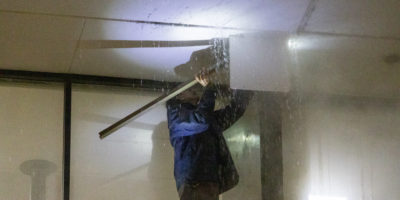By Nikhil Sharma
Professors’ academic expectations are not translating to some TAs, resulting in inconsistencies in how students are graded.
Reza Khonsari, a second-year civil engineering student, was recently penalized for not following his TA’s personal teaching methods.
“For some questions, what [the TA] does is use his own methods,” Khonsari said. “Those methods aren’t what we’re taught in class [by the professor].”
When Khonsari approached his professor to address the deductions, he was told that the TA should have awarded him with a higher grade than he received.
Miscommunication between TAs and professors doesn’t only influence students’ evaluations, it can also affect students’ learning experiences.
Gatrey Scott, second-year chemistry student, said that TAs need to do a better job of telling students what’s expected of them in laboratories to minimize confusion.
In chemistry labs, safety is a concern because of the reactive substances students are working with. When there’s miscommunication between students and TAs, students may not be able to understand the risks involved with certain experiments, which can put people in dangerous situations.
Miscommunication can also result in students not being able to fully complete their labs.
In one of Scott’s labs, the TA instructed the class to heat a chemical solution to a near boiling point, instead of the standard procedure of fully boiling the mixture for 15 minutes. The instructions could have been dangerous due to the possibility of students burning themselves or misusing the chemicals.
“My current TA doesn’t give us a real rundown of the lab first,” Scott said. “That kind of just makes confusion for the whole laboratory.”
Dianne Nubla, a lecturer at the school of professional communication, said that miscommunications between TAs and professors are common in every educational work environment.
Nubla added that miscommunication can also happen because of students’ low attention spans, TAs not being present in classes and various methods of how professors explain assignments.
“If a miscommunication does occur, it’s best to settle it sooner rather than later in the form of a student emailing me for further clarification or approaching me in class,” she said.
Nubla added that there is more work required from the professor’s end, especially if the TA is not present in class. She said that professors act as mediators between students and their TAs.*
James Coulter, who was a TA at Ryerson during the 2014-15 school year, said he doesn’t think TAs absence from lectures leads to unjust marking schemes. He said he thinks inconsistencies may come from an issue of students not taking enough initiative with their school work.
Coulter also believes the issues students are complaining about rooted in in varying levels of TAs’ commitment to students.
“There was some difficulty finding some sort of consistency across other teaching assistants, provided that it seemed like there was a disparate level of commitment provided to the students we were supposed to supervise,” he said.
Ryan Phillips, a TA in the politics and public administration department, said he hasn’t encountered this kind of miscommunication as an issue. He said TAs are encouraged to attend lectures, but it’s not mandatory.
Some courses at Ryerson do not require tutorials, so many TAs don’t hold them. As a result, students aren’t given the opportunity to ask questions in person to those who will be marking them.
According to the CUPE Local 3904, Unit 3 collective agreement, 2014-2017, the duties of a graduate or teaching assistant may include, attending lecture and holding office hours.
The collective agreement states that graduate assistants and teaching assistants who are assigned to a laboratory or tutorial session are paid to the number of lab contract hours they’re supposed to work per week.
Every contract hour has a value of 32.5 hours over a 13-week period. A contract hour includes tutorial sessions, marking duties, student counselling and meeting with the supervising instructor.
Nubla said a TA’s mandatory attendance at lectures and holding tutorials depends on the class.
“I find that tutorials really help bring life to the content, and if possible, students who are attending them will get a much more enriching experience,” she said.
“But it really comes down to the professors and their management of it.”
*CORRECTION: A previous version of this story incorrectly stated that Dianne Nubla said that TAs act as mediators between students and their professors. She actually said that professors act as a mediator between students and their TAs. The Eyeopener regrets this error.












Leave a Reply